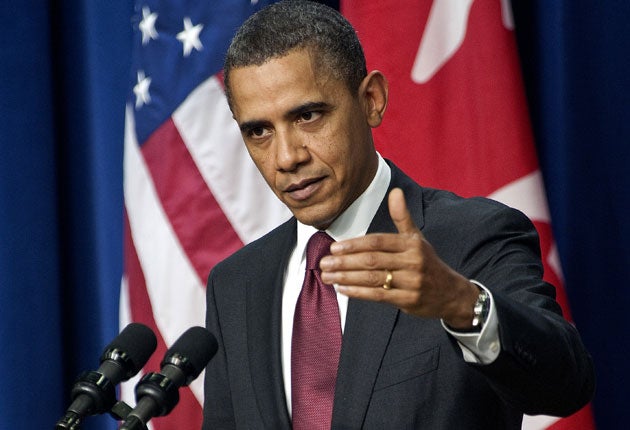Obama challenges American businesses to 'get in the game'

Your support helps us to tell the story
From reproductive rights to climate change to Big Tech, The Independent is on the ground when the story is developing. Whether it's investigating the financials of Elon Musk's pro-Trump PAC or producing our latest documentary, 'The A Word', which shines a light on the American women fighting for reproductive rights, we know how important it is to parse out the facts from the messaging.
At such a critical moment in US history, we need reporters on the ground. Your donation allows us to keep sending journalists to speak to both sides of the story.
The Independent is trusted by Americans across the entire political spectrum. And unlike many other quality news outlets, we choose not to lock Americans out of our reporting and analysis with paywalls. We believe quality journalism should be available to everyone, paid for by those who can afford it.
Your support makes all the difference.President Barack Obama yesterday threw down a challenge to American business to "get in the game" and start spending some of the $2 trillion (£1.2trn) sitting on corporate balance sheets to create new jobs and boost the sluggish national economy.
"I know many of you are waiting for demand to rise before you get off the sidelines and expand, and that demand has risen more slowly than any of us would like," Mr Obama told the US Chamber of Commerce.
But many economists are forecasting a sustained boost in consumer demand. That – and new tax measures passed by Congress, whereby business could now write off 100 per cent of capital investment against tax – meant the time was ripe for companies to start ploughing back their surging profits, he said. "Now is the time to invest in America," Mr Obama said.
Mr Obama's choice of venue yesterday was widely seen as signal of his determination to rebuild ties with corporate America in general – and with the Chamber in particular, a vocal opponent of many of his administration's initiatives, including healthcare reform and Wall Street regulation.
The White House outreach has only redoubled after the Democrat's crushing mid-term defeat, which left Mr Obama with little choice but to move to the political centre if he hoped to work with the Republican-controlled House of Representatives – not to mention win back the independent voters who backed him in 2008 but deserted him in droves last November.
One clear statement of intent was the choice of William Daley as the new White House Chief of Staff. A former Commerce Secretary under President Bill Clinton, Mr Daley is a skilled negotiator with close ties to business.
Another signal was Mr Obama's appointment of Jeff Immelt, CEO of General Electric, to head a new Council on Jobs and Competitiveness.
"I'm here today because I'm convinced we can and must work together," Mr Obama said, acknowledging the two sides had had their differences in the past.
Still, he did not pull his punches, telling his polite-but-subdued listeners that they also had to ask themselves what they could do for the country – when the economy was not creating the jobs to reduce an unemployment rate of 9 per cent and when the highest earners were doing better than ever – even as average incomes had stagnated over the past three years.
The benefits of growth "can't just translate into greater profits and bonuses for those at the top", Mr Obama said. "They should be shared by American workers, who need to know that expanding trade and opening markets will lift their standard of living as well as your bottom line.
"We cannot go back to the kind of economy – and culture – we saw in the years leading up to the recession, where growth and gains in productivity just didn't translate into rising incomes and opportunity for the middle class."
Mr Obama also forcefully defended his healthcare reform. He insisted that a degree of government regulation was needed – even as he repeated his promise to strip away bureaucratic red tape that stood in the way of business.
Join our commenting forum
Join thought-provoking conversations, follow other Independent readers and see their replies
Comments